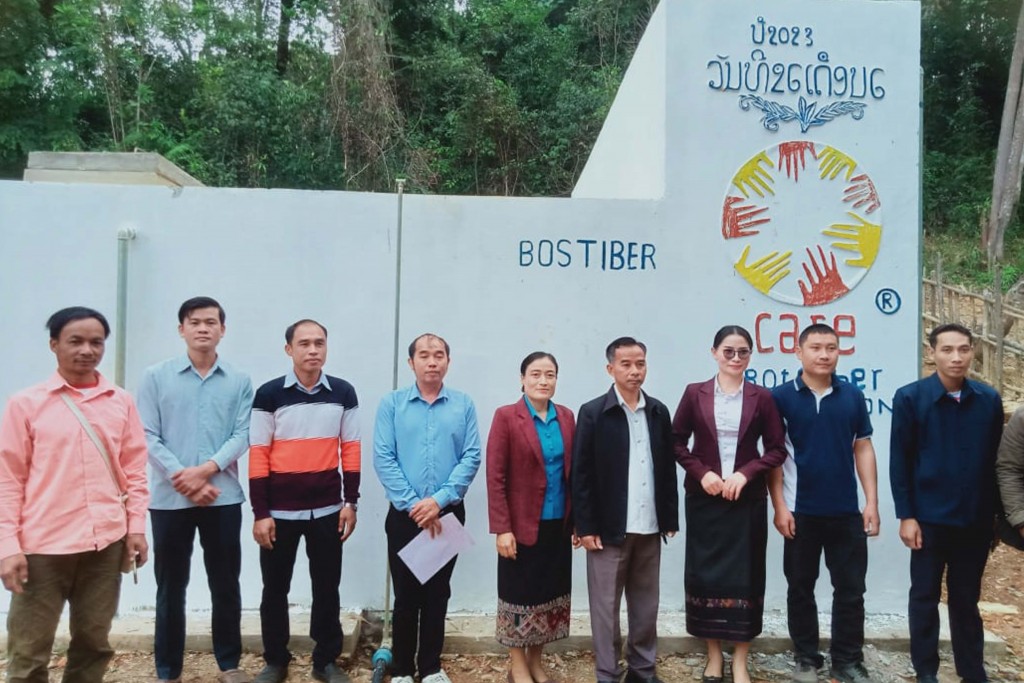Lahang-Mokmang village is one of the villages of the Lahang Yai group, Khoua District in Phongsaly Province. It is located 43 km away from the municipality, bordering with Ton Chong village to the north, Nambone Tai and Sapor villages to the south, Nambon Nuea village to the east, and Chala Kao – Chala Mai villages to the west.
The village is made up of two ethnic groups, the Khmu and Akha-Loma, and includes 104 households with 132 families. In total, there are 579 people in the village, of which 242 are women. There are four families with members who are disabled, two men and two women. The primary occupations of the people are farming, plantation, cultivation, livestock, and gathering of forest products. Up to now, Lahang-Mokmang village had insufficient water due to the increase in population and a water source that is often dry. Life of the people in the village was difficult because the water source can only be used during the rainy season from June to December. If one year sees less rain, the water source dries up faster. When there is water, it takes a long time to get it because people have to wait in long queues to fill up their containers, sometimes bringing buckets or used water bottles to collect water to carry back to their homes.
As one villager said, “I had a lot of trouble when my wife gave birth because there was not enough water to wash clothes and bathe my wife and baby. I must go and collect water from a stream that is far away and it’s very difficult to go there and come back, carrying water. Some days there is no water, which affects the health of my wife and children.”

When there is not enough water in the area, the hygiene of the entire village is affected as schools, homes, and hospitals cannot be cleaned properly. The toilets cannot be used and cleaned regularly, and households cannot be maintained. When the school lacks water, some students have to move to other village schools, and when the small hospital lacks water, it cannot be as hygienic as it should be, which can be quite dangerous to patients.
If use of water is very limited, some families do not shower after returning from work. “When I come home from work, I have to go and collect water I need to bathe. Some days there is not enough water for me to take a bath. It’s a bad day when I have to sleep without showering after a long day of sweaty work in the fields,” another man in the village said.
In August 2022, the Khoua Food Security Project, together with the Khoua District Health Office, the District Agriculture and Forestry Office, and the District Lao Women’s Union collected information related to water issues in the area and investigated the possibility of building a water supply. During the month of May 2023, the project provided materials, equipment, and experts to lead the construction. Together with the villagers, construction took place under the leadership of the District Health Office, with construction beginning June 26. Construction was completed July 26 and included the construction of water basin, sediment basin, water reservoir, filter basin, adjustment of the construction area of the water reservoir, and the connection of the pipeline from the reservoir to the school, the health center, and 104 households.

Since the completion of the installation, villagers have easy access to clean water throughout the season, reducing the hard work of women and girls in the village. In general, the time spent collecting water has been reduced by 97%! It is now easier for villagers to maintain good hygiene and take a shower. The toilet can be cleaned and used normally. In addition, there is more time to go to other tasks because people are not wasting time waiting in lines to collect water.
“In my life, in all my 40 years, I never dreamed that there would be a day when water is so convenient – and that I have enough water for my household. I am very happy. There is no comparison,” said one villager
The villagers are very happy and thankful that the food security project acknowledged and addressed their issues and overcame the negative aspects and technical techniques to bring them access to water. They are grateful to have water for consumption comfortably throughout the year, resulting in a better quality of life.
Everyone was in agreement that they will take care of and protect the water system so that the incident of lack of water does not happen again.
